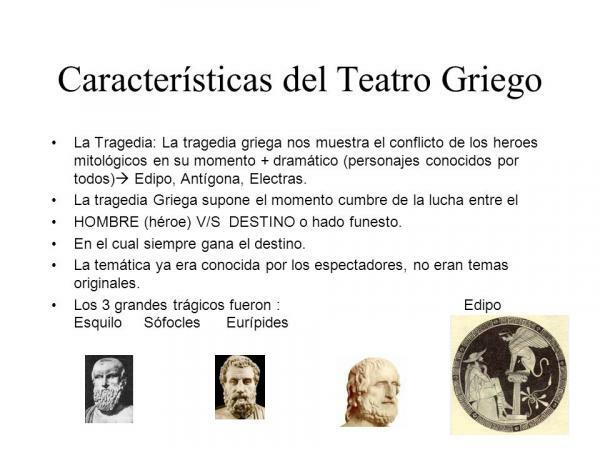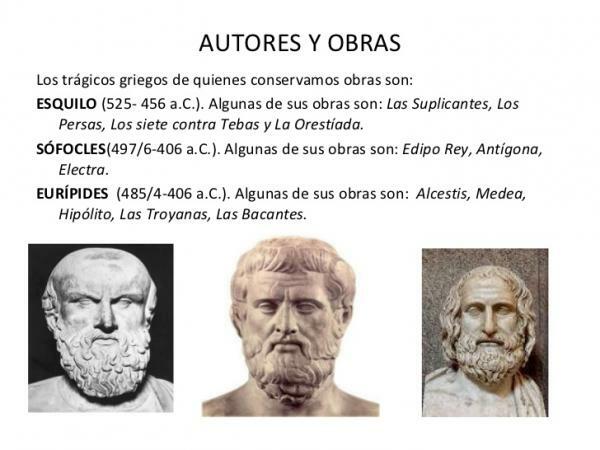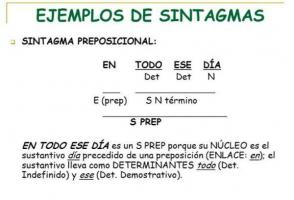Discover the CHARACTERISTICS of the Greek tragedy

Image: Steemit
The origin of the theater dates back to the time of Ancient Greece when playwrights of the moment began to create tragedies and comedies that conquered a large part of society. When we speak of "tragedy" we are referring to a type of theatrical genre which featured dramatic works with sad and sobering endings. These pieces were represented in the theaters of Greece from VI BC being those of Aeschylus the earliest works of which we have evidence and by Sophocles and Euripides the last, which appeared in the V century. In this lesson from a TEACHER we are going to discover you the most important characteristics of the Greek tragedy that will help you better understand what this theatrical genre that was so important to the history of our literature consists of.
Index
- Brief introduction to Greek tragedy
- Main characteristics of Greek tragedies
- The 3 authors of the most outstanding Greek tragedies
Brief introduction to the Greek tragedy.
Before going fully into talking about the characteristics of the Greek tragedy, it is important that we better understand the causes that led to the appearance of this type of subgenre. The tragic authors pursued better understand behavior of men and, for this, they created fictitious situations in which characters had to develop and solve problems. In this way, fiction became, something like that, like a human laboratory that brought authors closer to the knowledge of society.
For Aristotle, tragedies led characters to extreme situations of the soul and of the emotions so that, thus, the author could understand what behaviors the human being should carry out to try to redeem himself. That is to say, the purpose of tragedies was always to give a message of ethics or morality that would help society understand which path should and should not be taken.
In general terms, Greek tragedies tell us a succession of unfortunate stories that happen to a specific character. These works talk about the great themes of humanity as, for example, the existence of destiny, the punishment of the gods, envy, loneliness, and so on. They are works that, although they are carried out by specific characters, are still social models with which they try to create a social model to follow or avoid. It is for this reason that the gods are always present in these tragedies since they are the ones who have divine power and those who will end up making the balance fall to one side or the other.
The tragic works that were written during Antiquity were those that achieved lay the foundations of a new theatrical genre that, over the years, would gradually consolidate: the tragic theater.

Image: Slideshare
Main characteristics of the Greek tragedies.
Let's go fully into knowing the characteristics of the Greek tragedy and, for this, here we will offer you a list of the most outstanding ones. You should know that it was in the Aristotle's "Poetics" where the rules or norms that tragedies should follow were set. In general, this writing pointed out that the texts should be focused on a painful subject and that it had the objective of knowing better the human being. The moral judgment of society was also another of the final objectives to be pursued with these works.
The chorus in Greek tragedy
Of course, one of the most prominent characteristics of Greek tragedy is the existence of the choir. It was a group of people who embodied a specific character in the play and who, with songs and music, they indicated the messages of the gods or explained to the public the parts of the story that were not seen on stage. At first, the choirs were 12 people but Sophocles increased it to 15 and, from then on, all the tragedies had this number of choristers.
The masks of tragedy
We have to take into account that, in the ancient greek theater, the performance spaces were of great dimensions and they monopolized a massive public. Therefore, the actors had to make use of masks and costumes that were able to better convey the expressions and emotions that the characters were experiencing. These masks were made of cork or linen and they expressed pain or sadness.
The number of actors
Tragedies had a small cast of actors. In fact, the usual thing was that there were two that appeared at the beginning of the work and three at the end. Of course: women could not act in Ancient Greece, all roles, even female, were performed by men. In the vast majority of plays, the characters did not enter and exit the stage, but were present on stage throughout the performance.
The structure of the Greek tragedy
This theatrical subgenre had a very specific and marked structure. Here we leave you how this type of piece was configured:
- Foreword: the beginning of any tragedy was made with a prologue that contained a monologue or a simple dialogue and that presented the theme of the tragedy.
- Parodos: then the chorus entered and performed what is known as "the entrance song", that is, the first song of this character.
- Episodes: they are like the current theatrical acts and, normally, a play was divided between 3 and 5 episodes.
- Very: after each episode this tragic element takes place in which the choir comments or reacts to the events that have taken place on stage.
- Exodus: is the end of the play and takes place at the end of the last episode. It is the last song of the choir and with which this character leaves the stage.

Image: SlidePlayer
The 3 authors of the most outstanding Greek tragedies.
And to end this lesson on the characteristics of Greek tragedy, we are going to recall the most representative authors of this literary genre. Here we offer you the 3 most prominent names and that most influenced the development of the tragic theater.
Aeschylus (525/524 BC. C.- 456/455 a. C.)
For many scholars, Aeschylus is the "father" of tragedy in Ancient Greece. His influence could be seen in other later authors such as great names such as Sophocles or Euripides.
In his time, he was a well-known author as it is known that he won 13 times the theater competition known as the Great Dionysians. It is known that he wrote about 70 tragedies, yet to us so we have only received 7 completely and intact.
Some best known works of Aeschylus They are:
- Agamemnon
- The Eumenides
- Chained Prometheus
Sophocles (496 BC) C. - 406 a. C.)
He was one of the most innovative authors and important of Ancient Greece. His objective was to achieve more current works that would connect better with the Greek public, for that reason, he included some changes in the subgenre such as, for example, a greater depth of the characters, the appearance of a third actor, the increase of the chorus from 12 to 15, etc.
Historians indicate that he wrote about 120 tragedies, yet we have only received 7 complete creations and which, today, remain true masterpieces.
Some Sophocles' featured titles They are:
- King Oedipus
- Electra
- Antigone
Euripides (484/480 BC. C. - 406 a. C.)
And finally, we will talk about Euripides, another of the most prominent tragic poets in history. He is the last author to cultivate this genre and, for many, he was the one who most influenced later writers.
She wrote about 90 plays but, to us, only 19 reached us. Some of the best known works of this author were:
- Medea
- Electra
- Andromache
- Helena
- Orestes

Image: Slideshare
If you want to read more articles similar to Greek tragedy: characteristics, we recommend that you enter our category of History of Literature.



